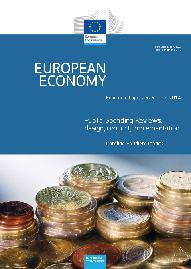Steinkamp, S. & Westermann, F. (2014) “The role of creditor seniority in Europe’s sovereign debt crisis“. Economic Policy, Vol. 29, Issue 79, pp. 495–552. The share of public debt that is held by lenders with preferred creditor status (i.e. the IMF, ECB, ESM, etc.) has increased substantially during Europe’s sovereign debt crisis. Empirically, we document in both macro and survey data that there exists a close relationship between the increase …Read More
Vocational education and training and the Great Recession: supporting young people in a time of crisis
Heyes, J. (2014) “Vocational education and training and the Great Recession: supporting young people in a time of crisis“, Report 131, European Trade Union Institute (ETUI). During the last five years training and education policies have received strong support at European and international levels. Emphasis has been placed on Initial Vocational Education and Training (IVET) and apprenticeships – which enable workers to gain a foothold in the labour market …Read More
Addressing weak inflation: The European Central Bank’s shopping list
Claeys, G., Darvas, Z., Merler, S. & Guntram, B. (2014) “Addressing weak inflation: The European Central Bank’s shopping list“, Bruegel Institute, Policy Contributions, 06 Μαΐου. There are clear benefits to price stability. High inflation can distort corporate investment decisions and the consumption behaviour of households. Changes to inflation redistribute real wealth and income between different segments of society, such as savers and borrowers, or young and old. Price stability …Read More
Can Investment Save Europe?
Pisani-Ferry, J. (2014) “Can Investment Save Europe?“, Project Syndicate, 30 Ιουλίου. Economic growth in Europe remains disappointing. Virtually all European Union members are expected to post higher output in 2014; but, according to the International Monetary Fund’s latest projections, the average growth rate in the eurozone will barely exceed 1%. And, whereas the British economy is displaying strong momentum, its GDP has only now surpassed the pre-crisis mark. In …Read More
Financial crises: lessons from history for today
Sayek, S. & Taskin, F. (2014) “Financial crises: lessons from history for today“, Economic Policy, Vol. 29, Issue 79, pp. 447–493. Making use of the propensity score matching method, we match earlier crises (pre-2007) with currently ongoing crises (post-2007). The old and new crises are matched in three dimensions: the global setting in which they occurred, the structure of the economy and the domestic vulnerabilities in the pre-crisis period. Our …Read More
Co-operative Banking in Greece: A Proposal for Rural Reinvestment and Urban Entrepreneurship
Papadimitriou, Β. D. & Toay, T. (2014) “Co-operative Banking in Greece: A Proposal for Rural Reinvestment and Urban Entrepreneurship“, Levy Economics Institute, Research Project Reports, Ιούλιος. The crisis in Greece is persistent and ongoing. After six years of deepening recession, real GDP has shrunk by more than 25 percent, with total unemployment now standing at 27.2 percent. Clearly, reviving growth and creating jobs should be at the top of …Read More
Public Spending Reviews: design, conduct, implementation
Vandierendonck, C. (2014) “Public Spending Reviews: design, conduct, implementation“, European Economy, European Commission Economic Papers, 525, Ιούλιος: Βρυξέλλες. This paper proposes to highlight the main features and key success factors of the design, conduct and implementation of spending reviews, based on the experiences of EU Member States. Public expenditure accounts for almost half of the annual wealth created in the EU (49.0% of GDP in 2013). A major policy …Read More
Can large primary surpluses solve Europe’s debt problem?
Eichengreen, B. & Panizza, U. (2014) “Can large primary surpluses solve Europe’s debt problem?“, VoxEU Organisation, 30 Ιουλίου. For the debts of European countries to be sustainable, their governments will have to run large primary budget surpluses. But there are both political and economic reasons to question whether this is possible. The evidence presented in this column is not optimistic about Europe’s crisis countries. Whereas large primary surpluses for …Read More
The Meaning of a British Exit from the European Union
McCormick, J. (2014) “The Meaning of a British Exit from the European Union“, LSE EUROPP, 29 Ιουλίου. Since January 2013, and the announcement by British Prime Minister David Cameron of his plan to hold a referendum on continued UK membership of the European Union, there has been much speculation about the possible effects of a so-called ‘Brexit’. However, it can be no more than speculation, because no member state …Read More
Why is financial stability essential for key currencies in the international monetary system?
Goldberg, L., Krogstrup, S. & Rey, H. (2014) “Why is financial stability essential for key currencies in the international monetary system?“, VoxEU Organisation, 26 Ιουλίου. The dollar’s dominant role in international trade and finance has proved remarkably resilient. This column argues that financial stability – and the policy and institutional frameworks that underpin it – are important new determinants of currencies’ international roles. While old drivers still matter, progress …Read More







